News
Why Elon Musk wants to ‘delete’ an agency that protects your money

The CFPB aims to protect Americans from vested financial interests big and small. That’s why oligarchs want it gone.
The Silicon Valley Bros are not fans of the Consumer Financial Protection Bureau. Elon Musk would like you to know that he believes the bureau is an unnecessary bureaucratic hiccup and one that should not exist. “Delete CFPB,” he posted on X last week, adding it’s “duplicative,” a perfect target, he seemed to indicate, for his DOGE commission to improve government efficiency. Musk’s comment was in response to, yes, another post, this one detailing claims about the agency made by venture capitalist Marc Andreessen on Joe Rogan’s popular podcast. Andreessen claimed the CFPB is the personal fiefdom of Sen. Elizabeth Warren, D-Mass., and that it pursues political and business vendettas against Republicans and small, scrappy fintech startups on behalf of Democrats and the big banks.
None of this is true. The amount of bad faith and seemingly deliberate duplicity on display here — by Musk, Andreessen and many who support them online — is staggering. The CFPB aims to protect to the American people from vested financial interests big and small, ranging from too-big-to-fail banks to fly-by-night payday loan lenders to Silicon Valley fintech startups. Almost all these interests hate it, not because the agency is “duplicative,” but precisely because it is not.
Over its almost 13 years, the agency has stopped numerous financial ripoffs and returned billions of dollars to the public. Its mere existence provides an ongoing demonstration of how the government can effectively stand up to big money interests and protect the American people. Fittingly, Musk — and other Silicon Valley titans — want it to go away.
On Rogan’s program, Andreessen claimed the CFPB orders “debanking” — that is, forced shutting down of bank accounts and other financial tools — for those it believes have “the wrong politics.” But debanking is, for the most part, not a CFPB issue — and where it is, the CFPB is doing the exact opposite of what Andreessen claimed. In August, the CFPB filed a brief in a legal case arguing that debanking of religious conservatives is a form of discrimination. At a panel earlier this year, CFPB Director Rohit Chopra argued that this amounts to payment services’ “setting laws or conditions outside of the democratic process.” On Tuesday, the CFPB followed this up by making it clear a proposed new rule would, if finalized stop the sale by data brokers of personal info to scammers, could also combat debanking that occurs because of identify theft or other fraud.
Nor is the CFPB harassing fintech investors or the myriad crypto backers who quickly stepped forward online to claim they would be unfairly unbanked. In some of these cases, it appears that banks are acting pre-emptively in an attempt to comply with money laundering statutes governing banking of the Federal Reserve and federal regulatory agencies like the Office of the Comptroller of the Currency. I happen to agree this is a bit much — I’m no crypto fan, but there is a concept called innocent till proven guilty, after all — but it would help if Andreessen acknowledged that there is plenty of evidence of crypto’s being used to enable cash laundering, tax evasion and other illegal behavior. But again, the CFPB has little to nothing to do with any of this.
However, the CFPB has a lot to do with regulating the fintech space, which is something that Andreessen, Musk and the rest of Silicon Valley are very interested in.
Let’s start with what Andreessen did not disclose to Rogan’s audience. In 2021, the CFPB shut down a fintech named LendUp Loans after the agency flagged and fined it multiple times for offenses including lying to customers and tricking them into taking on high-interest loans. Earlier this year, the bureau announced it would distribute nearly $40 million to “118,101 consumers who were deceived by LendUp Loans.” It was a humiliating end for a firm whose backers, according to The Wall Street Journal, included “some of the biggest names in venture capital, including … Andreessen Horowitz.” Yes, that Andreessen.
More broadly, under Chopra, the CFPB has moved in on the Wild West environment of digital payment and wallet apps, including not just Venmo and PayPal but also Google and Apple. It has subjected them to federal oversight and issued regulations governing their behavior regarding fraud — not dissimilar to how traditional banks are treated.
Silicon Valley, unsurprisingly, is no more happy to subject itself to rules than Wall Street is. In particular, Musk — who has made it no secret that he would like X to branch into digital financial services — has a long track record of attempting to bend the government to his will and flouting its authority when he cannot. Musk, Andreessen and their allies, harking back to when the Valley was still a hotbed of productive innovations, view themselves as scrappy insurgents, not the powerful and obscenely wealthy men they truly are.
All of this combines to make the dismantling of the CFPB a goal of many of President-elect Donald Trump’s Silicon Valley supporters. There is copious evidence that Trump and his cronies plan to govern in an oligarchical style, rewarding friends and punishing enemies. The CFPB, born out of the financial crisis, stands in the way of all that. Little wonder Musk and company think it needs to go.
News
Trump Nominates Conservative Lawyer Harmeet Dhillon To Lead DOJ Civil Rights Division
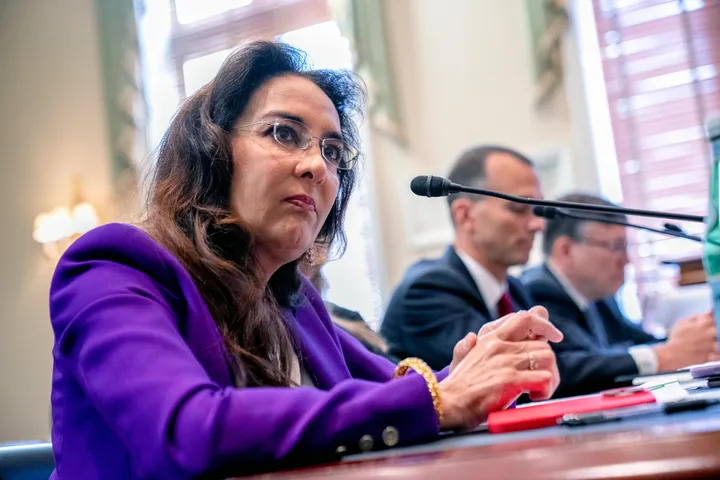
Harmeet Dhillon was chosen by the president-elect to replace Kristen Clarke on the Justice Department’s civil rights efforts.
President-elect Donald Trump announced on Monday that he plans to nominate a conservative California attorney to lead a critical division of the Department of Justice.
Harmeet Dhillon, a former vice chairwoman of the California GOP and a national committeewoman for the Republican National Committee, was selected by Trump to serve as assistant attorney general for civil rights at the Justice Department. She would replace Kristen Clarke, who became the first woman and first Black woman to run the division in 2021.
Trump, who described Dhillon as one of the “top Election lawyers” in the country in his Truth Social announcement, said that she would have a large role in voting rights enforcement.
“Throughout her career, Harmeet has stood up consistently to protect our cherished Civil Liberties, including taking on Big Tech for censoring our Free Speech, representing Christians who were prevented from praying together during COVID, and suing corporations who use woke policies to discriminate against their workers,” he wrote.
Dhillon combated stay-at-home orders during the COVID-19 pandemic. She filed several lawsuits against government-level regulations, arguing there was overreach. The lawsuits Dhillon filed came after Democratic California Gov. Gavin Newsom became the first governor to issue statewide stay-at-home orders to shut down nonessential activities and interests to combat the spread of the coronavirus.
In 2018, Dhillon founded the conservative nonprofit The Center for American Liberty, which has filed lawsuits challenging vaccine requirements and trans-inclusive school policies. Most notably, Dhillon currently represents Chloe Cole, a young activist who sued Kaiser Permanente in California after she detransitioned from male to female. Cole has rallied alongside Republican politicians and conservative media figures, and has testified in support of dozens of state laws restricting access to gender-affirming care for trans youth.
Dhillon is highly critical of blue states that aim to uphold and protect rights for transgender people in light of ongoing legislative attacks. She said Maine’s “shield” law, which protects reproductive health care providers and trans people, is “unconstitutional” and expressed concerns about future protections in California.
A staunch opponent of abortion herself, the attorney also unsuccessfully represented anti-abortion activist David Daleiden, who in 2016 used a fake driver’s license to pose as a biomedical company executive and tried to buy fetal tissue from Planned Parenthood, in an effort to accuse the health care provider of selling tissue for profit.
Dhillon, who was born in India and is a practicing Sikh, has faced pushback from fellow Republicans due to questions of her faith. After she announced in 2022 that she would challenge RNC Chair Ronna McDaniel for her position, several members of the RNC circulated a video of Dhillon opening a 2016 Republican National Convention with a Sikh prayer. In a letter to Alabama Republicans in 2023 responding to the incident, Dhillon addressed concerns about her faith and slammed McDaniel’s leadership. Alabama Republican Chris Horn questioned how Dhillon’s religion would impact policy to NBC. McDaniel condemned attacks on religion but told Politico her allies questioned how Dhillon’s faith would impact the party.
Last year, former Fox News host and conservative political commentator Tucker Carlson hired Dhillon to represent him in a gender discrimination lawsuit by his former producer, Abby Grossberg. The ensuing settlement resulted in Fox paying Grossberg $12 million.
“I’m extremely honored by President Trump’s nomination to assist with our nation’s civil rights agenda,” Dhillon said in a post on X (formerly known as Twitter). “It has been my dream to be able to serve our great country, and I am so excited to be part of an incredible team of lawyers led by @PamBondi. I cannot wait to get to work!”
News
Trump’s Utterly Absurd Take On Birthright Citizenship Involves Walking Infants
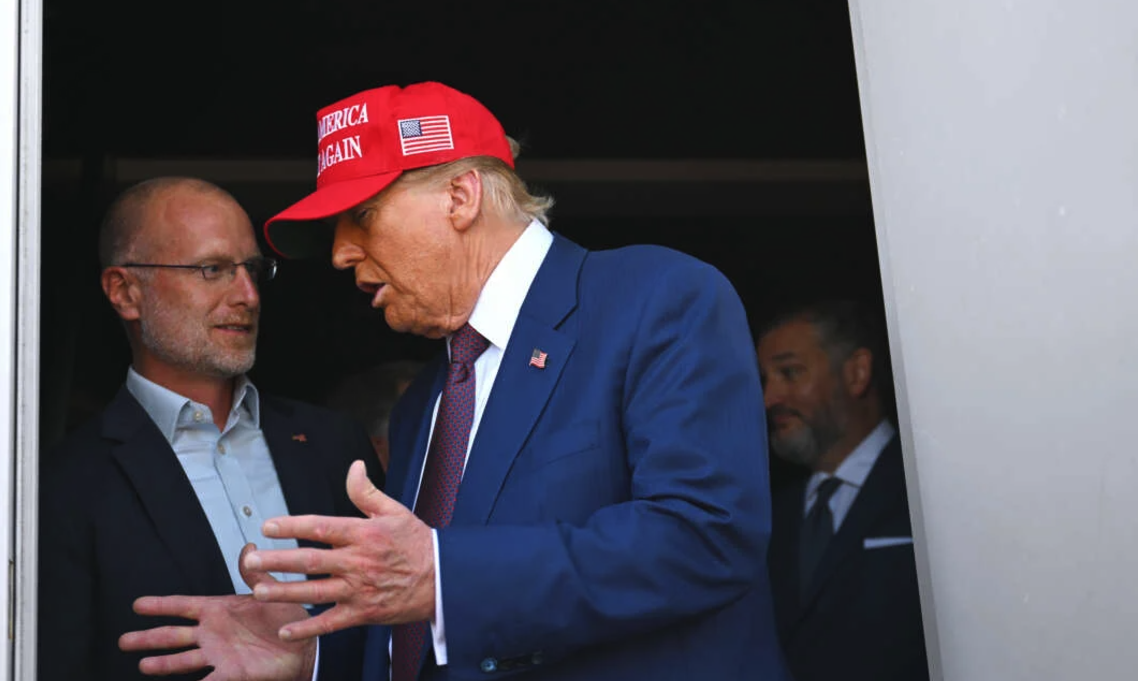
The president-elect appeared very confused about how American citizenship is conferred.
In a freewheeling interview with NBC News Sunday, President-elect Donald Trump offered a head-scratching explanation for his plan to wage an attack on birthright citizenship.
“Did you know, if somebody sets a foot — just a foot, one foot, you don’t need two — on our land, congratulations, you are now a citizen of the United States of America,” Trump said, when discussing birthright citizenship.
“Yes, we’re going to end that, because it’s ridiculous,” he added.
Trump appeared to describe a hypothetical scenario in which a woman would give birth to an infant who — either capable of walking at birth or helped along by someone eager to win a bet — would set one foot on American soil and the other in either Mexico or Canada.
It is also possible Trump was imagining an infant hopping or standing on one leg. Neither scenario is plausible.
Trump also repeatedly asked whether the interviewer, Kristen Welker of “Meet the Press,” knew that the United States was the only country that conferred citizenship by birthright.
“We’re the only country that has it, you know,” Trump said. “You know we’re the only country that has it.”
Birthright citizenship is commonly recognized in the Americas, including in Canada and Mexico. Also known by its Latin legal term as “jus soli,” it is the concept of conferring citizenship by birth in a given country. Most countries instead recognize “jus sanguinis,” which instead confers citizenship based on the nationality of a person’s parents.
Welker did not challenge Trump’s utterly wrong description of how birthright citizenship works or that the United States is not alone in recognizing it. But she asked whether Trump intended to enact his proposed change through executive action.
“Well, if we can, through executive action,” Trump said. “I was going to do it through executive action, but then we had to fix COVID first, to be honest with you.”
Birthright citizenship is protected by the 14th Amendment to the Constitution. The president cannot use executive action to overturn a constitutional amendment, though legal experts expect the Trump administration to challenge the long-settled legal interpretation through the courts.
Trump has spent significant time in southern Florida, which is home to a large Cuban-American community.
He likely came up with this weird description of birthright citizenship by free-associating the issue with the now-defunct policy of allowing Cuban migrants to stay within the United States and pursue citizenship upon touching American soil. The policy was known as “wet-foot, dry-foot.”
During this year’s presidential campaign, Trump repeatedly described immigrants as coming from jails and mental institutions. He was likely resurrecting assertions he heard during the era of the Mariel boatlift four decades ago.
News
Trump Trolls Canadian Prime Minister Justin Trudeau, Stirs Controversy

Trump mocks the United States’ northern ally
In a post just after midnight on Truth Social, Trump took aim at Canadian Prime Minister Justin Trudeau with a mocking reference, calling him “Governor Justin Trudeau of the Great State of Canada.”
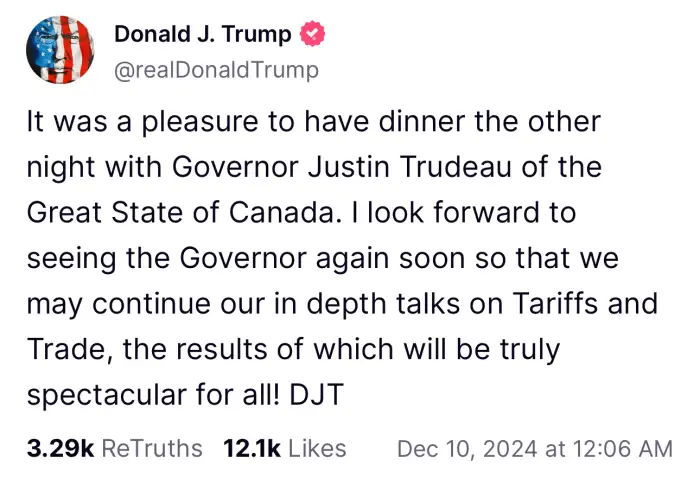
The comment, a throwback to Trump’s past suggestion that Canada might become the 51st U.S. state if they can’t handle his tariffs, is an insult to both Trudeau and Canada.

Trump recently posted an AI image of himself looking into Canada as if to annex it. Trump’s midnight post, claiming to look forward to future discussions on tariffs and trade with “Governor Trudeau,” further stoked tensions with a key ally and makes one question his diplomatic judgment.
Trump’s post undermines the United States’ relationship with Canada. Calling the Canadian leader a “Governor” belittles the sovereignty of a close neighbor and trading partner, and further feeds into the narrative of disrespect that Trump has often displayed toward foreign leaders.
The United States and Canada share deep economic, cultural, and geopolitical ties, and statements like this can jeopardize decades of cooperation. Trump is proving once again he will be an embarrassment to the United States.
-
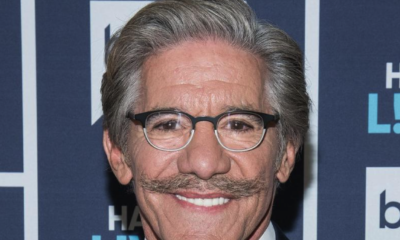
 News11 months ago
News11 months agoGeraldo Rivera Slaps Trump Supporters With A Reality Check After Biden’s Pardon
-
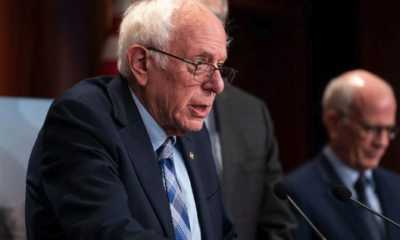
 News11 months ago
News11 months agoBernie Sanders Flips The Script And Praises Trump Picks
-

 Uncategorized11 months ago
Uncategorized11 months agoNaked RFK Jr. Makes Cameo On Wife Cheryl Hines’ Social Media
-

 News11 months ago
News11 months agoPhoto of person of interest with the mask down was the “money shot,” police commissioner says
-
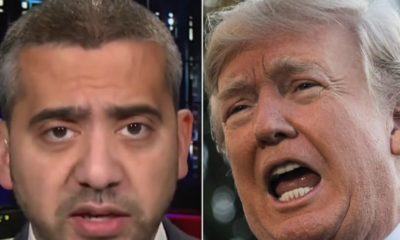
 News11 months ago
News11 months ago‘Banana Republic Stuff’: Mehdi Hasan Nails GOP Hypocrisy Over Trump’s Latest Move
-

 News11 months ago
News11 months agoBREAKING: Canada just stunned Trump with brutal news after holding an “emergency meeting.” This WON’T end well for Trump…
-
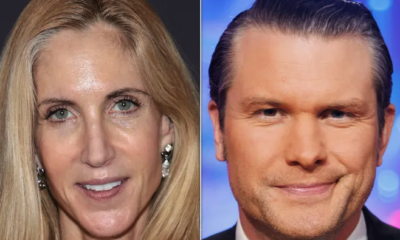
 News11 months ago
News11 months agoAnn Coulter Slams Controversial Trump Cabinet Nominee As ‘Sleazy’ Serial Adulterer
-

 News11 months ago
News11 months agoTrump Is Using “Unitary Executive” Theory in His Bid to Amass Supreme Power






